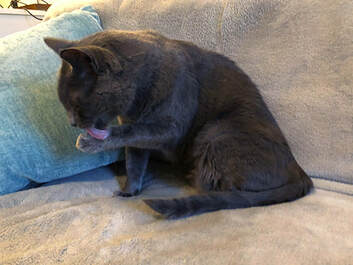
Are you all too familiar with the sight of your favorite feline excessively licking her paws? Have you ever pondered the possible reason or combination of reasons behind it? If so, then peruse the following:
Allergies: When cats have allergies – contact, food, pollen or seasonal – they tend to lick repetitively at the itchy rash produced by the allergy in an effort to find some relief from the discomfort they feel. Unfortunately, this excessive licking only aggravates the rash and makes the situation worse.
Anxiety: When cats are extremely anxious or stressed, they, much like anxious people who bite their fingernails or gnaw at their cuticles, will start incessantly licking their paws as a way of releasing that stress. If you find that your kitty seems overly anxious or stressed, make an appointment to visit the vet. Your cat may then be prescribed anti-anxiety medications to both help manage her stress levels and allow her to enjoy a more comfortable, more carefree life.
Boredom: As with anxiety, cats may counter their feelings of boredom by excessively licking their paws – even if it results in some of their fur falling out. The cause of this boredom is a lack of satisfying mental and physical stimulation throughout the day. To keep your kitty from getting bored when you’re gone, ensure she has various assorted toys, including puzzle toys, set out a cat tunnel, and provide her with a cat tower to climb. Then, when you return, set aside as much time as possible to interact with her using wand toys and laser lights to keep her leaping and pouncing while strengthening the bond between the two of you.
Fleas: A seemingly unseen infestation of fleas will often cause uncomfortable cats to continuously lick their paws. If you suspect that your cat has fleas, carefully part her fur and look closely at her skin. Then check several spots on her body for fleas or flea dirt or both. If she does indeed have fleas, ask your vet to recommend the best and safest feline flea medication in order to resolve this pesky problem as swiftly as possible.
Injury: Any trauma or injury to a cat’s leg, foot or paw pad may cause her to lick obsessively at that particular paw. If you think your cat may have hurt herself, try to get a closer look at her paw. If she’s bleeding (some cats will cut their paw pads when walking on “forbidden” surfaces) or if something seems amiss (it could potentially be a sprain or a broken bone), arrange to have her seen as quickly as possible by your vet.
Pain: One of the most common causes of obsessive paw licking is pain. And if your cat is in pain, she may literally be trying to lick it away by focusing her attention on the paw in question. Observe her closely awhile for some visible sign of a problem with that paw. Then, if she’ll allow you to touch it, gently move the paw around and monitor her reaction. If there is none, breathe a sigh of relief but continue to monitor her. If, however, she winces, cries out or tries to bite you, contact your vet immediately.
If none of the above scenarios applies to your particular cat, bring her, along with your questions and concerns, to your vet for a more accurate diagnosis.









 RSS Feed
RSS Feed